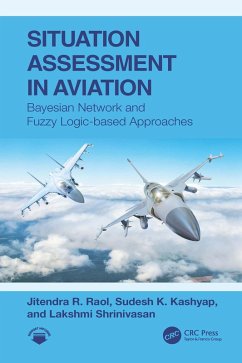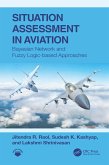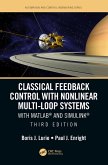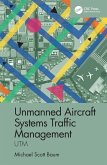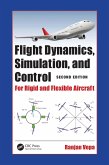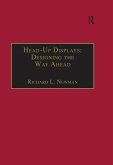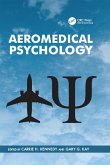Jitendra R. Raol, Sudesh K. Kashyap, Lakshmi Shrinivasan
Situation Assessment in Aviation (eBook, ePUB)
Bayesian Network and Fuzzy Logic-based Approaches
170,95 €
170,95 €
inkl. MwSt.
Sofort per Download lieferbar

85 °P sammeln
170,95 €
Als Download kaufen

170,95 €
inkl. MwSt.
Sofort per Download lieferbar

85 °P sammeln
Jetzt verschenken
Alle Infos zum eBook verschenken
170,95 €
inkl. MwSt.
Sofort per Download lieferbar
Alle Infos zum eBook verschenken

85 °P sammeln
Jitendra R. Raol, Sudesh K. Kashyap, Lakshmi Shrinivasan
Situation Assessment in Aviation (eBook, ePUB)
Bayesian Network and Fuzzy Logic-based Approaches
- Format: ePub
- Merkliste
- Auf die Merkliste
- Bewerten Bewerten
- Teilen
- Produkt teilen
- Produkterinnerung
- Produkterinnerung

Bitte loggen Sie sich zunächst in Ihr Kundenkonto ein oder registrieren Sie sich bei
bücher.de, um das eBook-Abo tolino select nutzen zu können.
Hier können Sie sich einloggen
Hier können Sie sich einloggen
Sie sind bereits eingeloggt. Klicken Sie auf 2. tolino select Abo, um fortzufahren.

Bitte loggen Sie sich zunächst in Ihr Kundenkonto ein oder registrieren Sie sich bei bücher.de, um das eBook-Abo tolino select nutzen zu können.
Situation Assessment in Aviation new aspects of soft computing technologies for evaluation and assessment of situations in aviation scenarios. It considers using technologies, emerging from: multisensory data fusion (MSDF), Bayesian networks (BN), and fuzzy logic (FL), to assist pilots in their decision making.
- Geräte: eReader
- mit Kopierschutz
- eBook Hilfe
Andere Kunden interessierten sich auch für
![Situation Assessment in Aviation (eBook, PDF) Situation Assessment in Aviation (eBook, PDF)]() Jitendra R. RaolSituation Assessment in Aviation (eBook, PDF)170,95 €
Jitendra R. RaolSituation Assessment in Aviation (eBook, PDF)170,95 €![Artificial Intelligence for Space: AI4SPACE (eBook, ePUB) Artificial Intelligence for Space: AI4SPACE (eBook, ePUB)]() Artificial Intelligence for Space: AI4SPACE (eBook, ePUB)85,95 €
Artificial Intelligence for Space: AI4SPACE (eBook, ePUB)85,95 €![Classical Feedback Control with Nonlinear Multi-Loop Systems (eBook, ePUB) Classical Feedback Control with Nonlinear Multi-Loop Systems (eBook, ePUB)]() Boris J. LurieClassical Feedback Control with Nonlinear Multi-Loop Systems (eBook, ePUB)42,95 €
Boris J. LurieClassical Feedback Control with Nonlinear Multi-Loop Systems (eBook, ePUB)42,95 €![Unmanned Aircraft Systems Traffic Management (eBook, ePUB) Unmanned Aircraft Systems Traffic Management (eBook, ePUB)]() Michael Scott BaumUnmanned Aircraft Systems Traffic Management (eBook, ePUB)48,95 €
Michael Scott BaumUnmanned Aircraft Systems Traffic Management (eBook, ePUB)48,95 €![Flight Dynamics, Simulation, and Control (eBook, ePUB) Flight Dynamics, Simulation, and Control (eBook, ePUB)]() Ranjan VepaFlight Dynamics, Simulation, and Control (eBook, ePUB)140,95 €
Ranjan VepaFlight Dynamics, Simulation, and Control (eBook, ePUB)140,95 €![Head-Up Displays: Designing the Way Ahead (eBook, ePUB) Head-Up Displays: Designing the Way Ahead (eBook, ePUB)]() Richard L. NewmanHead-Up Displays: Designing the Way Ahead (eBook, ePUB)189,95 €
Richard L. NewmanHead-Up Displays: Designing the Way Ahead (eBook, ePUB)189,95 €![Aeromedical Psychology (eBook, ePUB) Aeromedical Psychology (eBook, ePUB)]() Aeromedical Psychology (eBook, ePUB)152,95 €
Aeromedical Psychology (eBook, ePUB)152,95 €-
-
-
Situation Assessment in Aviation new aspects of soft computing technologies for evaluation and assessment of situations in aviation scenarios. It considers using technologies, emerging from: multisensory data fusion (MSDF), Bayesian networks (BN), and fuzzy logic (FL), to assist pilots in their decision making.
Dieser Download kann aus rechtlichen Gründen nur mit Rechnungsadresse in A, B, BG, CY, CZ, D, DK, EW, E, FIN, F, GR, HR, H, IRL, I, LT, L, LR, M, NL, PL, P, R, S, SLO, SK ausgeliefert werden.
Produktdetails
- Produktdetails
- Verlag: Taylor & Francis eBooks
- Seitenzahl: 424
- Erscheinungstermin: 29. Februar 2024
- Englisch
- ISBN-13: 9781000998900
- Artikelnr.: 69958140
- Verlag: Taylor & Francis eBooks
- Seitenzahl: 424
- Erscheinungstermin: 29. Februar 2024
- Englisch
- ISBN-13: 9781000998900
- Artikelnr.: 69958140
- Herstellerkennzeichnung Die Herstellerinformationen sind derzeit nicht verfügbar.
Jitendra R. Raol received his B.E. and M.E. degrees in electrical engineering from M.S. University (MSU) of Baroda, Vadodara, in 1971 and 1973, respectively, and a Ph.D. (in electrical & computer engineering) from McMaster University, Hamilton, Canada, in 1986. He joined the National Aeronautical Laboratory (NAL) in 1975. At CSIR-NAL, he was involved in the activities on human pilot modeling in fix- and motion-based research flight simulators. He re-joined NAL in 1986 and retired in July 2007 as Scientist-G (and Head of Flight Mechanics and Control division at CSIR-NAL).
He was a Fellow of the IEE/IET (United Kingdom) and a senior member of the IEEE (United States). He is a life-fellow of the Aeronautical Society of India and a life member of the Systems Society of India. He has published nearly 160 research papers and numerous technical reports. He had guest-edited two special issues of Sadhana and two special issues of the Defense Science Journal (New Delhi, India). He has co-authored an IEE/IET Control Series book, Modeling and Parameter Estimation of Dynamic Systems (2004) and several CRC Press books: Flight Mechanics Modeling and Analysis (2009); Nonlinear Filtering: Concepts and Engineering Applications (2017); Control Systems: Classical, Modern, and AI based Approaches (2019). He has also authored several CRC Press books: Multi-Sensor Data Fusion with MATLAB (2010), and Data Fusion Mathematics: Theory and Practice (2015). He has also edited a CRC Press book: Mobile Intelligent Autonomous Systems (2012).
Sudesh K. Kashyap obtained his BE degree in Electronics Engineering (1995) from Gorakhpur University; ME in Electrical Engineering (1999) from MS University of Vadodara, Gujarat; and PhD in Electrical and Electronics Engineering (2008) from University of Mysore, Karnataka. He worked as a Project Assistant at CSIR-NAL & a Software engineer in Private company (Hewlett Packard) between 1999-2002. He joined CSIR-NAL as a scientist in Year 2002. Presently, he is working as a Senior Principal Scientist and is Group Head of System Identification and Data Fusion group of Flight Mechanics and Control Division at CSIR-NAL, Bangalore. His core expertise is in the area of Linear & Non-linear estimation, Multi-Sensor data fusion, Data Association, Track Fusion, Situation/Threat Assessment, HUD Symbology, Enhanced & Synthetic Vision System, Store Separation Trajectory Estimation, INS-GPS Integration, Target localisation, etc. He has published several National and International journal/conference papers. He received the CSIR-NAL Excellence Award in the field of 'Technology' for 'LCA Stores Separation Trajectory Estimation'. He was awarded CSIR, India, Software copyright on 'Data Acquisition Software for EVS Flight Experiment'. He also jointly holds two SW copyrights for: i) data fusion SW for real time target tracking in an integrated test range, and ii) SW for evaluation of fuzzy implication functions.
Lakshmi Shrinivasan earned her BE and MTech degrees in Electronics from Shivaji University and VTU in 1999 and 2007, respectively. She earned her PhD degree from Jain University, Bangalore in 2018. She has published several research papers in International and National journals and conferences and received the Best Research paper award in 2015 at a Research Retreat National conference organized by the Jain University. Currently, she is working as an Associate Professor at Ramaiah Institute of Technology in the Department of Electronics and Communication Engineering, teaching several undergraduate and postgraduate courses. She has guided several student projects, many of them received Best Project Awards at the Institute levels and received Karnataka Science and Technology Council (KSCST) & MSRIT Alumni Association Funds. Since 2021, she has been working on a consultancy project, which is focused on battery management and prediction techniques using estimation and prediction algorithms and digital dashboard for Electric Vehicles. Her research interests are Data Fusion, Situation Assessment, Fuzzy logic, Artificial Intelligence, Embedded System Design, VLSI, and Digital Twin Solutions for Situation Assessment.
He was a Fellow of the IEE/IET (United Kingdom) and a senior member of the IEEE (United States). He is a life-fellow of the Aeronautical Society of India and a life member of the Systems Society of India. He has published nearly 160 research papers and numerous technical reports. He had guest-edited two special issues of Sadhana and two special issues of the Defense Science Journal (New Delhi, India). He has co-authored an IEE/IET Control Series book, Modeling and Parameter Estimation of Dynamic Systems (2004) and several CRC Press books: Flight Mechanics Modeling and Analysis (2009); Nonlinear Filtering: Concepts and Engineering Applications (2017); Control Systems: Classical, Modern, and AI based Approaches (2019). He has also authored several CRC Press books: Multi-Sensor Data Fusion with MATLAB (2010), and Data Fusion Mathematics: Theory and Practice (2015). He has also edited a CRC Press book: Mobile Intelligent Autonomous Systems (2012).
Sudesh K. Kashyap obtained his BE degree in Electronics Engineering (1995) from Gorakhpur University; ME in Electrical Engineering (1999) from MS University of Vadodara, Gujarat; and PhD in Electrical and Electronics Engineering (2008) from University of Mysore, Karnataka. He worked as a Project Assistant at CSIR-NAL & a Software engineer in Private company (Hewlett Packard) between 1999-2002. He joined CSIR-NAL as a scientist in Year 2002. Presently, he is working as a Senior Principal Scientist and is Group Head of System Identification and Data Fusion group of Flight Mechanics and Control Division at CSIR-NAL, Bangalore. His core expertise is in the area of Linear & Non-linear estimation, Multi-Sensor data fusion, Data Association, Track Fusion, Situation/Threat Assessment, HUD Symbology, Enhanced & Synthetic Vision System, Store Separation Trajectory Estimation, INS-GPS Integration, Target localisation, etc. He has published several National and International journal/conference papers. He received the CSIR-NAL Excellence Award in the field of 'Technology' for 'LCA Stores Separation Trajectory Estimation'. He was awarded CSIR, India, Software copyright on 'Data Acquisition Software for EVS Flight Experiment'. He also jointly holds two SW copyrights for: i) data fusion SW for real time target tracking in an integrated test range, and ii) SW for evaluation of fuzzy implication functions.
Lakshmi Shrinivasan earned her BE and MTech degrees in Electronics from Shivaji University and VTU in 1999 and 2007, respectively. She earned her PhD degree from Jain University, Bangalore in 2018. She has published several research papers in International and National journals and conferences and received the Best Research paper award in 2015 at a Research Retreat National conference organized by the Jain University. Currently, she is working as an Associate Professor at Ramaiah Institute of Technology in the Department of Electronics and Communication Engineering, teaching several undergraduate and postgraduate courses. She has guided several student projects, many of them received Best Project Awards at the Institute levels and received Karnataka Science and Technology Council (KSCST) & MSRIT Alumni Association Funds. Since 2021, she has been working on a consultancy project, which is focused on battery management and prediction techniques using estimation and prediction algorithms and digital dashboard for Electric Vehicles. Her research interests are Data Fusion, Situation Assessment, Fuzzy logic, Artificial Intelligence, Embedded System Design, VLSI, and Digital Twin Solutions for Situation Assessment.
1. Introduction. 2. Situation Awareness. 3. Situation Assessment. 4. Theory of Fuzzy Logic. 5. Fuzzy Logic
based Decision Fusion and Fuzzy Filtering. 6. Performance Evaluation of Fuzzy Logic
based Decision System. 7. Situation Assessment Models and Use of Fuzzy Logic. 8. Interval Type 2 Fuzzy Logic (IT2FL)
based Decision System. 9. IT2 Fuzzy Logic Decision Fusion for Formation
Flying Recognition. 10. Bayesian Mental Models of a Pilot for SA in Air
to
Air Combat. 11. Fuzzy Logic and Bayesian Network
based SA in Air
to
Air Combat. 12. Approaches of Artificial Intelligence
based Situation Awareness and Assessment. Appendix A. Aviation Safety and Security. Appendix B. Aviation Sustainability. Appendix C. Situation Assessment Case Study
1. Appendix D. Situation Assessment Case Study
2.
based Decision Fusion and Fuzzy Filtering. 6. Performance Evaluation of Fuzzy Logic
based Decision System. 7. Situation Assessment Models and Use of Fuzzy Logic. 8. Interval Type 2 Fuzzy Logic (IT2FL)
based Decision System. 9. IT2 Fuzzy Logic Decision Fusion for Formation
Flying Recognition. 10. Bayesian Mental Models of a Pilot for SA in Air
to
Air Combat. 11. Fuzzy Logic and Bayesian Network
based SA in Air
to
Air Combat. 12. Approaches of Artificial Intelligence
based Situation Awareness and Assessment. Appendix A. Aviation Safety and Security. Appendix B. Aviation Sustainability. Appendix C. Situation Assessment Case Study
1. Appendix D. Situation Assessment Case Study
2.
1. Introduction. 2. Situation Awareness. 3. Situation Assessment. 4. Theory of Fuzzy Logic. 5. Fuzzy Logic
based Decision Fusion and Fuzzy Filtering. 6. Performance Evaluation of Fuzzy Logic
based Decision System. 7. Situation Assessment Models and Use of Fuzzy Logic. 8. Interval Type 2 Fuzzy Logic (IT2FL)
based Decision System. 9. IT2 Fuzzy Logic Decision Fusion for Formation
Flying Recognition. 10. Bayesian Mental Models of a Pilot for SA in Air
to
Air Combat. 11. Fuzzy Logic and Bayesian Network
based SA in Air
to
Air Combat. 12. Approaches of Artificial Intelligence
based Situation Awareness and Assessment. Appendix A. Aviation Safety and Security. Appendix B. Aviation Sustainability. Appendix C. Situation Assessment Case Study
1. Appendix D. Situation Assessment Case Study
2.
based Decision Fusion and Fuzzy Filtering. 6. Performance Evaluation of Fuzzy Logic
based Decision System. 7. Situation Assessment Models and Use of Fuzzy Logic. 8. Interval Type 2 Fuzzy Logic (IT2FL)
based Decision System. 9. IT2 Fuzzy Logic Decision Fusion for Formation
Flying Recognition. 10. Bayesian Mental Models of a Pilot for SA in Air
to
Air Combat. 11. Fuzzy Logic and Bayesian Network
based SA in Air
to
Air Combat. 12. Approaches of Artificial Intelligence
based Situation Awareness and Assessment. Appendix A. Aviation Safety and Security. Appendix B. Aviation Sustainability. Appendix C. Situation Assessment Case Study
1. Appendix D. Situation Assessment Case Study
2.
